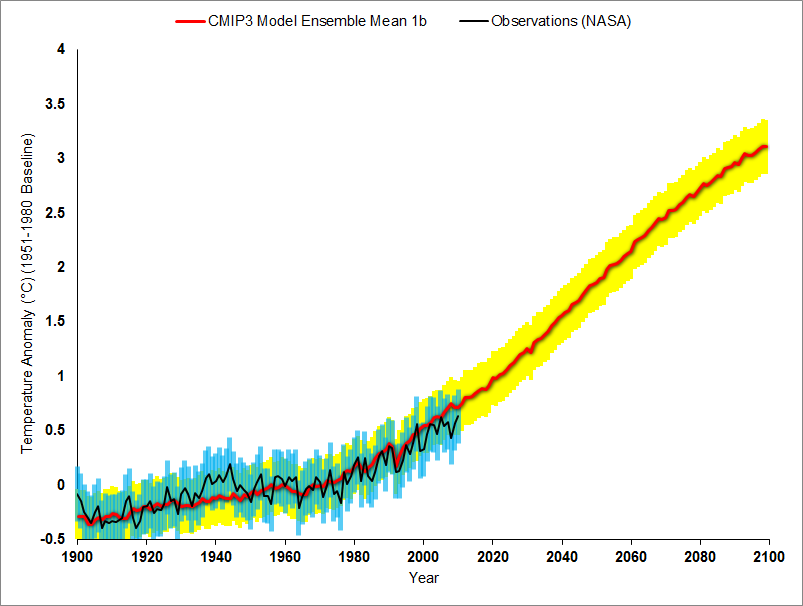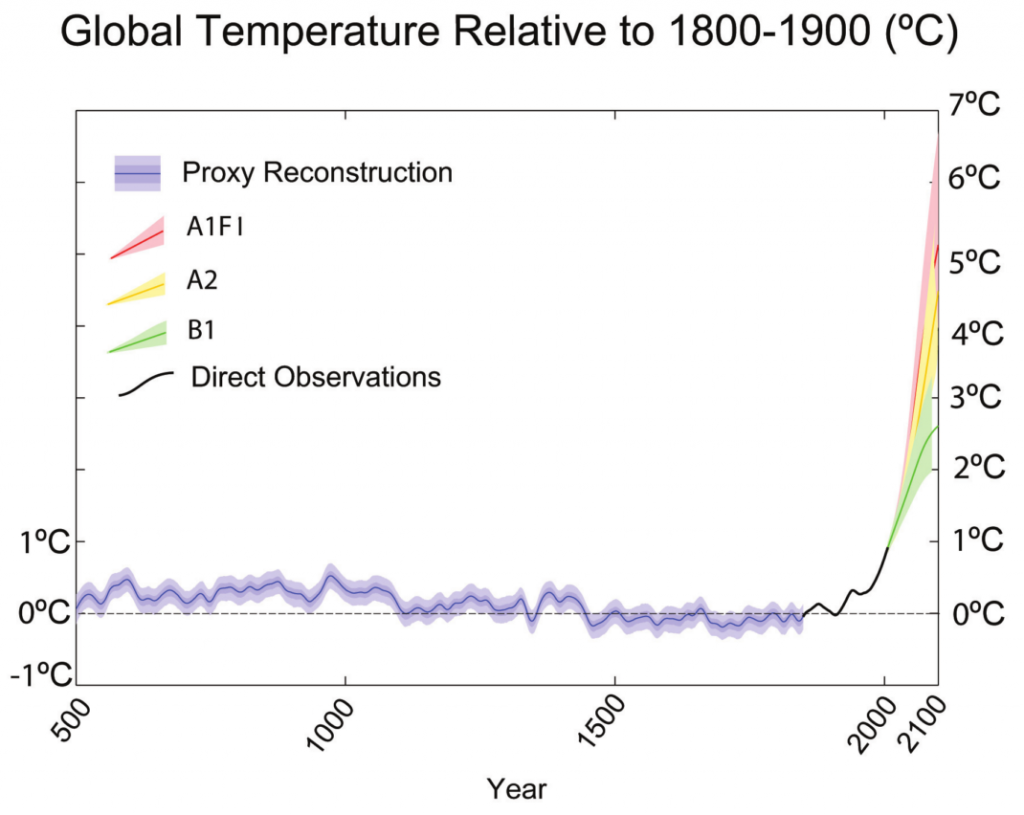Prudent Path Week
Posted on 21 February 2011 by dana1981
 On 28 January 2011, 18 climate scientists sent a letter to US Congress urging them to "take a fresh look at climate change" and the threats that it poses to the USA and the world. In response, a group of "skeptic" scientists issued a "rebuttal" on 08 February 2011. The rebuttal letter referenced two documents - a report issued by co2science.org entitled 'Carbon Dioxide and Earth's Future: Pursuing the Prudent Path', and the NIPCC report. According to the letter, these two reports show a "profusion of actual observations of the workings of the real world showing little or no negative effects of the modest warming of the second half of the twentieth century", thus suggesting that the "prudent path" forward is to continue with business as usual.
On 28 January 2011, 18 climate scientists sent a letter to US Congress urging them to "take a fresh look at climate change" and the threats that it poses to the USA and the world. In response, a group of "skeptic" scientists issued a "rebuttal" on 08 February 2011. The rebuttal letter referenced two documents - a report issued by co2science.org entitled 'Carbon Dioxide and Earth's Future: Pursuing the Prudent Path', and the NIPCC report. According to the letter, these two reports show a "profusion of actual observations of the workings of the real world showing little or no negative effects of the modest warming of the second half of the twentieth century", thus suggesting that the "prudent path" forward is to continue with business as usual.
Missing the Point
The key to this "rebuttal" - and where it misses the point entirely - is in its argument that the "modest warming" thus far has not resulted in terribly negative consequences. From this the "skeptics" infer that continued warming will also not result in terribly negative consequences, and this is where they go wrong.
It's true that the consequences of anthropogenic climate change so far have been manageable. It's also true that global surface air temperatures have only increased about 0.8°C over the past century. On a century timescale, this is actually quite a large and rapid warming, and let's not forget that based on the greenhouse gases we've emitted to this point, we've already committed the planet to an additional 0.6°C warming, nearly twice as much as the "modest warming" thus far.
But we're not particularly concerned about current temperatures or the current climate. In fact, if we could maintain the climate and average global temperature at today's levels, everybody would be thrilled. The consequences of climate change so far have probably been more bad than good, but compared to the warming and climate change to come, our current temperatures and climate are quite manageable.
However, a business-as-usual scenario will not maintain the current temperature or climate. Quite the opposite, in fact. While the planet has only warmed about 0.8°C over the past century, the IPCC projects that in a business-as-usual scenario, the planet will warm 2.5–4°C over the next century. That's a net warming in the ballpark of 3 to 5 times as much as over the 20th century. A major factor that the "skeptics" are missing is the massive amount of heat which is going into the oceans, which is slowing the warming of the surface air, for the time being. But eventually, after atmospheric greenhouse gas levels stabilize, the planet will reach equilibrium and that unrealized surface air warming "in the pipeline" will happen. And to eventually stop global warming, we have to stabilize atmospheric greenhouse gas levels first!
Stop Poking the Bear
Suggesting that we should continue in a business-as-usual scenario because climate change so far hasn't been bad is like saying that because lightly poking a sleeping bear with a stick didn't awaken it, we should try throwing rocks at it.
Even with the "modest warming" thus far, the signs of what's to come are not good. Arctic sea ice is declining rapidly, the Greenland and Antarctic ice sheets are losing ice much faster than expected, sea level is rising faster than expected, glaciers are declining worldwide, and overall, the negative effects of climate change are already outweighing the positives. The bear is stirring. We need to stop poking it.
A Little Graphical Perspective
Let's try to put what these "skeptics" are suggesting into perspective. In the figure below, the black line with blue error bars represents the instrumental temperature record, and surface air temperature change from 1900 to 2010. This is the warming thus far which hasn't had terribly bad consequences. The red line with yellow range represents the warming to come over the next 90 years in one of the more moderate IPCC business-as-usual emissions scenarios (A1B - rapid global economic growth with a balanced emphasis on all energy sources).

Figure 1: Global surface temperature record (black - NASA GISS) with one-sigma error bars (blue) and model runs for the IPCC A1B emissions scenario (red, yellow). Image courtesy of Robert Way.
We can also step back even further and compare the projected temperature change over the next century to reconstructions over the past 1,500 years:

Figure 2: Northern Hemisphere proxy temperature reconstruction (purple - Mann et al. 2008) vs. the instrumental temperature record (black) and projected 21st Century surface temperature changes in various IPCC emissions scenarios (red, yellow, green). Source: Copenhagen Diagnosis.
Note that even in Scenario B1, which involves "a high level of environmental and social consciousness combined with a globally coherent approach to a more sustainable development", warming in the 21st Century exceeds that of the 20th Century. In the business-as-usual Scenarios A1F1 and A2, global warming and climate change absolutely dwarf the changes over the past 1,500 years.
That is what we're concerned about. We're not worried about the relatively modest warming and climate change over the past century, we're worried about the dangerous change to come over the next century because of the rapid rise in global greenhouse gas emissions in the "skeptics" favored business as usual scenario.
Prudent Path Week
In light of the information discussed above, we believe the true "prudent path" is to attempt to significantly reduce global greenhouse gas emissions. In the USA, this will probably involve implementing some sort of carbon pricing mechanism. But the bottom line is that continuing on a business-as-usual path is not prudent, it is exceptionally risky. Arguing that future warming will not be dangerous because the warming thus far has not been significantly damaging, as the "skeptics" did in their letter to US Congress, is illogical and incorrect.
Over the next week we will examine some of the arguments made in the Prudent Path and NIPCC documents, some of the contradictions therein, and further illustrate why business-as-usual is actually a very imprudent path.































 Arguments
Arguments






























Climate scientists are well aware that ocean cycles affect climate. You make a good point - it's a very good idea to examine what's happening to the oceans as they have a much greater heat capacity than the atmosphere (in fact, over 90% of global warming is going into the oceans). So when we take a close look at the ocean, what do we see?
Firstly, we find globally, the oceans are building up heat. This cannot be explained by ocean cycles - it can only be explained by the planet being in energy imbalance. Our climate is accumulating heat:
The pattern of ocean warming provides much information also - we see heat penetrating from the surface into the deep waters in all the oceans of the world. Peer-reviewed research into this warming pattern found "the observed ocean heat-content changes are consistent with those expected from anthropogenic forcing, which broadens the basis for claims that an anthropogenic signal has been detected in the global climate system." (Barnett 2007).